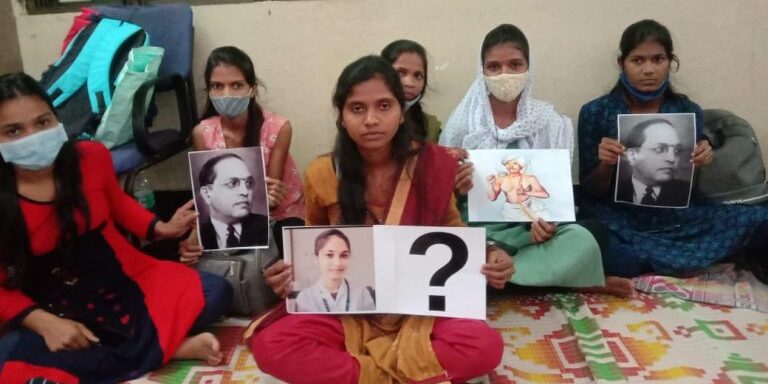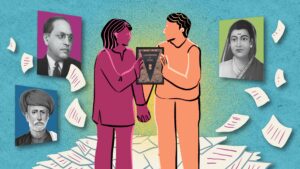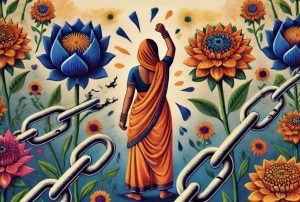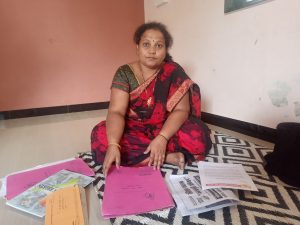Dalit and Adivasi Students’ Futures At Stake As Scholarship Schemes Cut

Sujata Lilaka (21), a final year nursing student at YMT Ayurvedic Medical College and Hospital in Kharghar in Panvel district of Maharashtra, collapsed on her way back to her village in Dahanu in Palghar district, in February this year. Hours later, she died at the hospital. Two of her classmates and friends, Ruchita Dhak and Anjali, had collapsed on that day too.
All three young women are Adivasi students, who were staying at an accommodation where seven girls were cooped in difficult circumstances. Before the pandemic, they were all residents of the Government Tribal Girls Hostel in Panvel. When the classes resumed earlier this year, the hostel administration refused to take them in.
“They claimed that they had not received orders to admit college students”, Dhak told Behanbox.
Unable to afford the Rs 500 daily fare for the four hour commute between her home and college, Sujata, the daughter of a daily wage worker, was forced to stay in a rented accomodation. She and her friends would travel back to their villages on the weekend to save water in the rented accommodation. Earlier that day, the landlord, livid on finding out that seven girls were living in a room that he had let out to four, had asked them to leave. Sujata and her friends had to vacate the room and travel back to their villages.
“Sujata was distressed about not having a place to stay. A day before her death, she cried in the class when a teacher asked us how we were managing without the hostel”, said Dhak.
Apart from the hostel facilities, the Adivasi students are also entitled to a monthly Direct Bank Transfer (DBT) of Rs 3,500 a month for food. Since the hostel was not admitting college students, Sujata had not received the amount for the months of January and February, 2021.
Sujata’s father, Bharat Suresh Lilaka (41), a daily wage worker is distraught. Only that morning, he had dropped his eldest daughter off at the Dahanu railway station.
“I had told Sujata not to go to college since the hostel would not admit her. I was worried about where she would stay and eat,” said Lilaka. “Had the hostel admitted my daughter, she would have been alive today.”
We know about Sujata’s case because she was in touch with our organization, said Budhbhushan Kamble, president of Ambedkar Student Association. “There are stories of students dropping out, worse even, dying due to financial adversity caused by non-payment of scholarships.”
“She died due to administrative negligence and apathy. The Ministry of Tribal Development needs to acknowledge this and compensate the family,” said Anandraj Ghadge, a member of Ambedkar Students Association.
A study titled ‘confronting the pandemic’, which examines the impact of the pandemic on educational attainment of Dalit and Adivasi students by National Campaign on Dalit Human Rights (NCDHR) and Dalit Aarthik Adhikar Andolan (DAA), states that most students were unable to access hostel facilities during the lockdown. This has put many students at a risk of dropping out of education or running into financial debt to incur accommodation-related expenses, states the report.
Scholarship schemes for Dalit and Adivasi students continue to be plagued by numerous issues – including lack of information among target groups, underutilisation of allocated funds, late disbursal of funds, non-payment of the scholarship amount, technical glitches that make schemes inaccessible, and diversion of funds — the future of these students, especially women students, remain engulfed in clouds of uncertainty.
Young Women Protest
On 17th November, nine months after Sujata’s death, four girls started a protest outside the Government Tribal Girls Hostel in Panvel demanding payment of the arrears under the Pandit Dindayal Upadhyay Swayam Yojna (PDUS) – a Maharashtra government scheme for Adivasi students who are unable to get admission to government hostels. Under the scheme, the students are entitled to receive Rs 60,000 annually as living expenses to complete their education.
“We have not received PDUS funds for the last one and a half years. Our demand is that they either release the funds or grant us admission to the hostel”, said Savita Shingda (26), a second year B.Ed student at Government College of Education, who led the protest.
Since the beginning of the pandemic, funds under the PDUS scheme were not disbursed by the finance ministry as colleges were closed. The ministry, after repeated requests, released the funds to the commissioner’s office in February, 2021. Since then, the portal where students have to apply for funding has been facing technical problems, an official from the tribal development department told Indian Express.
Shingda lives with her family in a village in Dahanu about 300 kms away from Panvel. Her father, a farmer, cannot support her with money needed for a private accommodation and daily commute.
“The hostel administration and the officials at the Ministry of Tribal Development kept stalling us and made us run from one office to another,” said Shingda.
The women students who decided to protest were forced to sleep outside the hostel. “Later in the day, they allowed us to stay in the hostel until all technical issues were resolved — which they said would take seven days,” she said.
After weeks of protest, the beneficiaries received Rs. 30,000 — one-third of the amount they are entitled to– in their accounts last week .
“The project officers at the commissionerate have been forcing us to vacate the hostels claiming that the money has been transferred. It is impossible to find accommodation and manage living and food expenses from the 30,000 rupees that they have given us”, said Shingda.
The scholarship amount becomes even more critical for students who have to often supplement this with other sources of income. Shingda herself has had to finance her education by taking up part-time jobs at pharmaceutical companies and hospitals. The monthly rent alone can be as high as Rs. 7,000 a month.
“While the scholarship money alone will not suffice for my monthly expenses, it is critical for me to get those 5,000 rupees so I can supplement it with part-time jobs”, Shingda told Behanbox.
“If I don’t get the scholarship money, I will have to drop out of college. I can’t imagine what it will feel like if I have to give up at this stage.”
The girls have refused to leave the hostel until the full amount has been transferred.
Behanbox tried reaching out to the deputy commissioner on phone and the commissionerate on the phone numbers listed on the website of the Ministry of Tribal Development, but received no response.
Budget Cuts Hamper Education
Fund cuts for scholarship schemes for students belonging to the marginalized communities is a result of the overall decline in the share of spending on education within the total union budget over the past five years — which has fallen from 3.7% in 2017 to 2.7% in 2021. In the last fiscal year alone, the education sector has seen a reduction of 6.13% in spending on education.
The New Education Policy (2020), just like the first released in 1968, recommends spending at least 6% of the Gross Domestic Product (GDP) towards education to achieve equality and inclusion. The current year’s allocation is 0.42% of GDP, a drop from 0.49% in 2017-2018.
According to the All India Secondary Higher Education (AISHE) 2019-20 report, Scheduled Caste (SC) students constitute 14.7% and Scheduled Tribe (ST) students 5.6% of the total students enrolled in schools. 37% of students belong to Other Backward Classes (OBC),5.5% are Muslims and 2.3% belong to other minority communities.
The national gross enrolment ratio (GER) is 27.1%– 26.9% for male students and 27.3% for female students. The GER for SC students is 23.4% (22.8% for male students and 23.4% for female students) and for ST students is 18% ( 17.7% for female students and 18.2% for male students)
Low educational attainment is a key challenge faced by weaker sections in the country, including the SC and ST communities, notes the NITI Aayog, a public policy think tank of the government of India, in its Strategy for New India @ 75, a comprehensive national strategy layout for the country’s development.
Despite these findings, the government of India, instead of increasing allocation for scholarship schemes, has discontinued certain successful schemes. Behanbox had reported earlier this year on the disbanding of the National Scheme for Incentive to Girl Child for Secondary Education (NSIGSE), a central government scheme aimed to incentivise education among girls belonging to SC and ST communities. The scheme was discontinued even as the former union education minister Ramesh Pokhariyal recognised its importance in helping girls complete secondary education and transitioning to senior/higher secondary level.
The Covid-19 pandemic and subsequent lockdowns have widened the existing educational inequalities, with students belonging to marginalized communities falling behind their peers due to unequal access to digital devices and the internet. 40% of Dalit and Adivasi students surveyed by the NCDHR and DAAA could not access online education. 51% of them said that this was due to the unavailability of smartphones or laptops.
Many students belonging to marginalized communities across India have had to drop out of schools and colleges. 68% of the students surveyed, reported not being able to continue their study because of lack of income and food insecurity.
“A major problem is that the students are not getting the funds on time. What we have observed is that students are getting their scholarships anywhere between one to three years after completing their education. This forces them to either drop out of education or take high-interest loans from moneylenders,” said Beena Pallical, general secretary of the Dalit Arthik Adhikar Andolan, an organisation that works on the economic rights of Dalits and Adivasis.
Since most beneficiaries of these scholarship schemes are first generation learners, the scheme is a means to take not just them but their entire family out of poverty, says Pallical.
“Before Rohith Vemula was forced to take his own life, he wrote in his letter that the scholarship money should be paid to his mother because the money had value for the entire family,” she said.
The gendered impact of the inconsistent payments under scholarship schemes on women students has worsened due the pandemic. The struggles of Dalit and Adivasi women students are both socio-cultural and infrastructural.
The study by NCDHR and DAAA noted that 21% women were forced to take up jobs during the pandemic. Fall in family incomes and lack of social insecurity has meant that families are forcing young girls and women to drop out of colleges and into early marriages. One-third of the total students surveyed by the NCDHR and DAAA report did not receive scholarships in the past year. Women students constitute nearly half (47%) of these students.
“We observed that when faced with the struggle to survive with limited resources, women’s education becomes a non-priority. For instance if there was one smartphone in the house, we found that it would be given to the boy,” said Pallical.
Lack of access to digital resources for women is also a barrier in accessing information crucial to educational attainment, especially those related to scholarship schemes.
Fund Cuts For Crucial Scholarship Schemes
Another scheme that has seen drastic budget cuts in recent years is the Post-matric scholarship (PMS) — the single largest scheme that supports the education of students belonging to SC, ST, OBC and other minorities. As of 2020-21, PMS provides financial assistance to 1.6 crore students belonging to households whose annual income is less than 2.5 lakh rupees, to enable them to pursue post matric education.
The NCDHR and DAA report found that out of the 68% students who were entitled to government scholarship schemes, 51% were accessing PMS. A large proportion of SC and ST students who applied for PMS are first-generation entrants into academia, with limited information about the scheme and its entitlements.
In recent years, the scheme has faced budget cuts and even a possibility of discontinuation and being replaced by an umbrella scheme worth Rs. 7,000 crores.
In the current fiscal year 2021-22, the allocation has reduced by 10.5% from the revised estimates of previous year. That the scheme is under funded is evidenced by the fact that the fund utilization has exceeded the allocation in all the years, except in 2018-19. In 2019- 20, utilization (Rs. 2,711 crores) exceeded allocation (Rs. 2,690 crores) by Rs. 21 crores.
Under utilization of the fund is also observed in the pandemic year in 2020-21. As on 21st February 2021, only Rs. 1,185 crore had been utilized against the revised estimate for allocation of Rs. 3,815 crore–a utilization rate of 31%.
A 2018 performance audit report by the Comptroller Auditor General (CAG) of the PMS scheme shows that between 2012-17, only 70% of the funds demanded by the Ministry of Social Justice and Empowerment were approved by the Ministry of Finance (MoF). In 2019-20, only 60% of the demanded funds were approved by the MoF. This has resulted in delayed payments to students as well as a reduction in the number of beneficiaries of the scheme.
A 2018 report on Education Schemes for Tribals by the Standing Committee on Social Justice and Empowerment observed that state governments were ‘reluctant’ to bear their share of liabilities related to the funds of the scheme leading to difficulties for ST students in continuing their education.
Similar schemes such as the National Merit-cum-Means Scholarship, a centrally-sponsored scholarship scheme that offers annual financial assistance of Rs. 1,000 per month to meritorious students of classes 7th to 12th belonging to economically weaker sections of the society, has seen a 19% reduction from the revised estimates of the year 2020-21.
Foreign Education Thwarted
For students from marginalized communities aspiring to study abroad, the National Overseas Scholarship (NOS) scheme, which provides financial assistance, is their only recourse.
The Ministry of Social Justice and Empowerment offers hundred scholarships — ninety for Dalit students from communities listed as Scheduled Castes, six for those from denotified, nomadic and semi-nomadic tribes, and four for landless agricultural labourers and traditional artisans. The Ministry of Tribal Affairs offers 20 overseas scholarships – 17 for Adivasi students and three for those belonging to particularly vulnerable tribal groups (PVTG).
According to the 2019-20 annual report of MSJE, even though hundred or more students were selected in 2017-18 and 2018-19, only 20% and 40% of the allocated funds were utilized respectively.
Beneficiaries under the scheme have also suffered due to bureaucratic delays.
“I know students studying in universities abroad under the scheme, who repeatedly receive notices from the university administration that the government has delayed the payment of their semester fees. Many of these students are facing an imminent threat of having their enrolment suspended,” said Kamble of the ASA.
Monalisa Barman, who belongs to the Koch indigenous tribe of Meghalaya was offered admission to the Master’s in Public Administration course at Columbia University in the USA. She needed 60 lakh rupees to secure her seat. But she was unaware of the National Overseas Scholarship scheme.
“When I finally got to know about the scholarship and decided to fill out the application form, the server of the application portal kept crashing. I wrote innumerable mails to the Ministry of Tribal Affairs but received no response. The website does not even mention a point of contact responsible for answering queries”, Barman told Behanbox.
“Agatha Sangma, an MP from my constituency, wrote an e-mail to the ministry regarding the issue I was facing but did not receive a response”, she added.
Like many marginalized students who could not get a scholarship, Barman finally resorted to crowdfunding to finance her study abroad. She was able to raise the funds needed to secure the admission and complete the first year of the course.
“I was lucky enough to find people who generously helped me take a step towards realizing my dream. Everyone is not lucky. And luck should not be the deciding factor”, said Barman.
Barman is yet to secure funds for her second year at Columbia, a thought that haunts her everyday.
“We can’t get bank loans since our family has no land. Depriving us of scholarships perpetuates the vicious cycle of poverty and exclusion that education might help us end”, she said.
“If the government wants to end the cycle of poverty that generations of these communities have been caught in, it is important that the scholarship funds are disbursed on time and the budgetary allocations are increased. Additionally any technical or fiscal bottlenecks should be cleared instantly, especially during pandemic times”, said Pallical.
We believe everyone deserves equal access to accurate news. Support from our readers enables us to keep our journalism open and free for everyone, all over the world.




